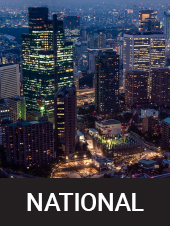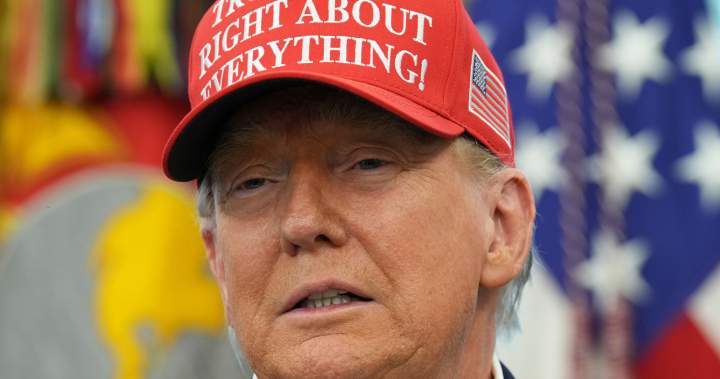U.S. President Donald Trump said Friday he’ll “see whose fault it is” if Russia doesn’t come to the table for direct peace negotiations with Ukraine in the coming days, as doubts grow over whether a high-level meeting will take place.
The White House said this week that Russian President Vladimir Putin had agreed to a meeting with Ukrainian President Volodymyr Zelenskyy within the next two weeks after a call with Trump, which came after Trump and Zelenskyy met with European leaders at the White House on Monday.
Yet Russia’s top diplomat said Friday no plans are in place for such a meeting, despite Trump saying he had begun arrangements for one as he seeks to end the three-and-a-half-year war.
Trump told reporters in the Oval Office on Friday that in two weeks he’ll “know the attitude of Russia, and frankly of Ukraine,” whether they’re ready to make peace, but was non-committal of whether there will be consequences if a meeting doesn’t happen.
“It’s going to be a very important decision, and that’s whether or not it’s massive sanctions or massive tariffs or both,” he said, without specifying which country he would punish. “Or we do nothing and say, ‘It’s your fight.’”
Asked if that means there’s a possibility he’ll do nothing when the two-week deadline passes, Trump replied: “I’ll see whose fault it is. If there’s reasons why, I’ll understand that.”
“I know exactly what I’m doing,” he added.
Russia started the current war in 2022 with its full-scale invasion of Ukraine, and continues to bombard the country with missile and drone attacks.
Trump has previously threatened to impose sanctions on Russia if it did not meet previous deadlines to begin negotiations, only to not follow through. A bipartisan package of additional Russian sanctions has languished in the U.S. Senate waiting for Trump’s approval.
Trump also abandoned his demands for an immediate ceasefire after meeting with Putin in Alaska last Friday. That summit sparked a flurry of meetings at the White House on Monday with Zelenskyy and European allies, which culminated with Trump calling Putin and pushing for a meeting with Zelenskyy.

Get daily National news
Get the day’s top news, political, economic, and current affairs headlines, delivered to your inbox once a day.
Asked by reporters Tuesday if Putin has agreed to hold that sit-down within the next two weeks, White House press secretary Karoline Leavitt replied: “He has.”
Yet in a taped interview with NBC’s Meet the Press that’s set to air Sunday, Russian Foreign Minister Sergey Lavrov said “there is no meeting planned” between the Russian and Ukrainian leaders.
Ukraine wants Western security guarantees to deter any post-war Russian attack, and U.S. and European officials are scrambling to come up with detailed proposals on how that might work.
But Lavrov said earlier this week that making security arrangements for Ukraine without Moscow’s involvement was pointless and “a road to nowhere.”
Prime Minister Mark Carney said Friday that Canada is part of the discussions as a member of the so-called “coalition of the willing,” and could play “an important role” in ensuring Ukraine’s security.
That means not just a “robust” Ukrainian military but also “security on the land, in the air and in the sea,” he said.
“There’s a role potential for the members of the coalition to provide support for all of those elements. We’ll see what role Canada might play within that within a broader group,” he told reporters in Ottawa.
He said he has “exchanged views in and around this” with Trump, including in a call Thursday, and will continue to do so.
Carney echoed earlier comments made by the Department of National Defence to Global News that Canada has helped strengthen Ukraine’s military through training by the Canadian Armed Forces in Europe throughout the war, suggesting that the operation could be part of the security guarantee.
Canada’s chief of the defence staff Gen. Jennie Carignan participated in a virtual meeting of NATO defence chiefs Wednesday to discuss Ukraine and the logistics around a future security agreement.
Carignan and national security advisors to the prime minister have also been in direct contact with their American counterparts, Carney said Friday.
European nations are expected to provide the bulk of resources toward a Ukraine security guarantee, including possible troops on the ground, which Russia has repeatedly rejected. Trump claimed Monday that Putin had agreed to some sort of Western “presence” in Ukraine in their conversations.
The U.S. would provide a backstop in the form of air support and other guarantees, according to Trump, who has ruled out sending U.S. ground troops to Ukraine.
French President Emmanuel Macron has underscored the importance of ensuring Ukraine’s security as well as protecting the rest of Europe from a future Russian attack, calling Putin a “predator” and “an ogre at our doorstep” in comments to French media this week.
On Thursday, a major Russian drone and missile attack on Ukraine struck an American-owned electronics plant, despite Trump’s criticism of Putin for continuing to bomb Ukrainian targets while talking peace.
Trump said Friday he’s “not happy” with the latest Russian attacks but did not hint at a potential response.
“The Russians are trying to do anything to avoid the (summit) meeting. The issue is not the meeting itself, the issue is that they do not want to end the war,” Zelenskyy said Friday during a press conference alongside NATO Secretary General Mark Rutte, who was visiting Kyiv.
“It is necessary that this space for avoidance be reduced,” Zelenskyy said. “U.S. and European unity will reduce this space.”
—With files from The Associated Press
Read the full article here


